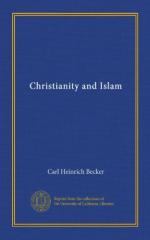Muhammed’s original view that earlier religions had been founded by God’s will and through divine revelation, led both him and his successors to make an important concession: adherents of other religions were not compelled to adopt Islam. They were allowed to observe their own faith unhindered, if they surrendered without fighting, and were even protected against their enemies, in return for which they had to pay tribute to their Muslim masters; this was levied as a kind of poll-tax. Thus we read in the Qoran (ix. 29) that “those who possess Scriptures,” i.e. the Jews and Christians, who did not accept Islam were to be attacked until they paid the gizja or tribute. Thus the object of a religious war upon the Christians is not expressed by the cry “Death or Islam”; such attacks were intended merely to extort an acknowledgment of Muhammedan supremacy, not to abolish freedom of religious observance. It would be incorrect for the most part to regard the warrior bands which started from Arabia as inspired by religious enthusiasm or to attribute to them the fanaticism which was first aroused by the crusades and in an even greater degree by the later Turkish wars. The Muhammedan fanatics of the wars of conquest, whose reputation was famous among later generations, felt but a very scanty interest in religion and occasionally displayed an ignorance of its fundamental tenets which we can hardly exaggerate. The fact is fully consistent with the impulses to which the Arab migrations were due. These impulses were economic and the new religion was nothing more than a party cry of unifying power, though there is no reason to suppose that it was not a real moral force in the life of Muhammed and his immediate contemporaries.
Anti-Christian fanaticism there was therefore none. Even in early years Muhammedans never refused to worship in the same buildings as Christians. The various insulting regulations which tradition represents Christians as forced to endure were directed not so much against the adherents of another faith as against the barely tolerated inhabitants of a subjugated state. It is true that the distinction is often difficult to observe, as religion and nationality were one and the same thing to Muhammedans. In any case religious animosity was a very subordinate phenomenon. It was a gradual development and seems to me to have made a spasmodic beginning in the first century under the influence of ideas adopted from Christianity. It may seem paradoxical to assert that it was Christian influence which first stirred Islam to religious animosity and armed it with the sword against Christianity, but the hypothesis becomes highly probable when we have realised the indifferentism of the Muhammedan conquerors.




